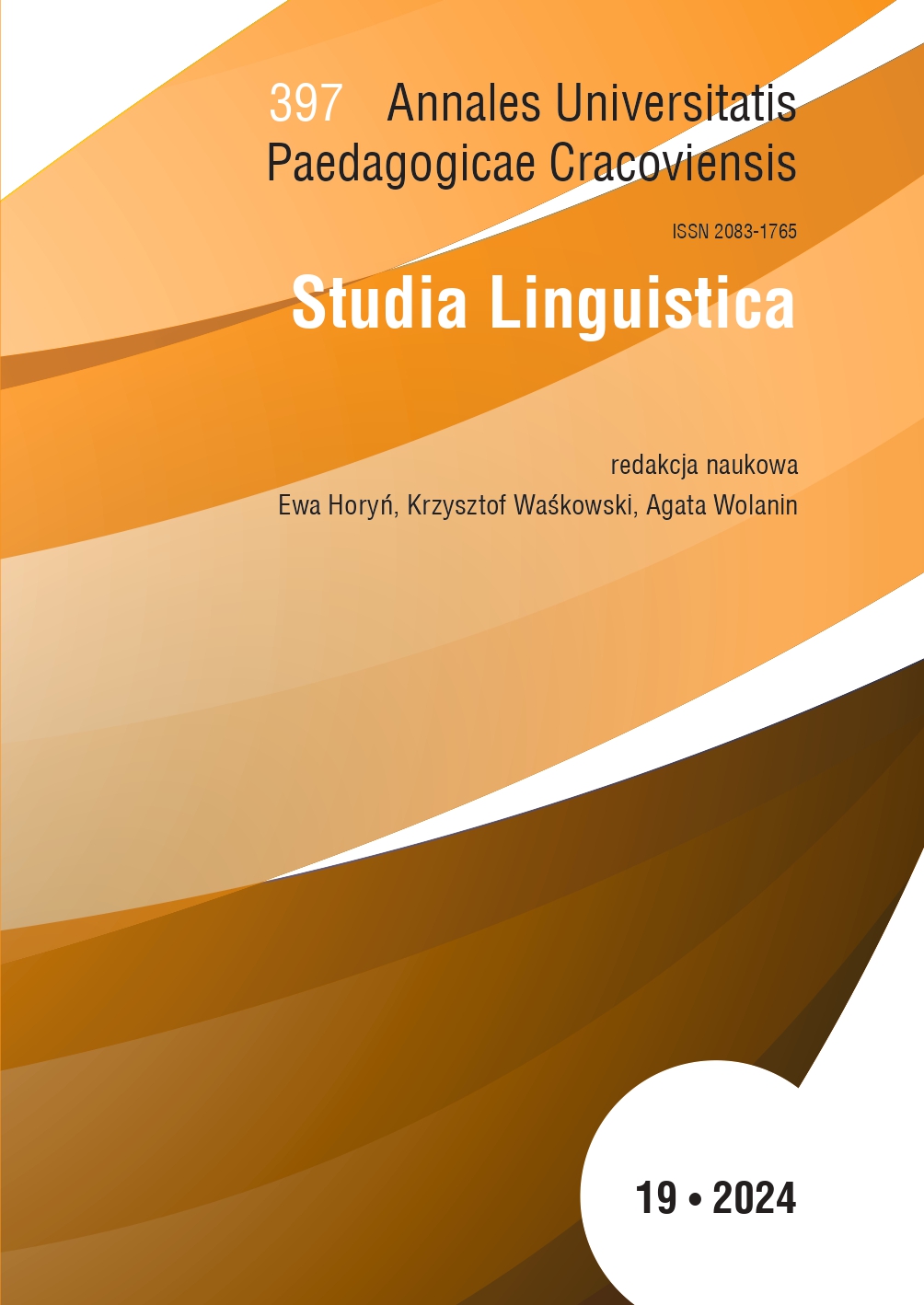What is going on in the media, or about language game in contemporary media texts
Main Article Content
Abstract
This article deals with language in the media. The aim of the study is to analyze the language game in contemporary media texts in the aspect of linguistic means used in it. The following research methods are used in the article: structural analysis method, semantic-connotation analysis method and functional-pragmatic analysis method. The results of the study showed that the dominant means of a language game in the research material of the article is lexical blending. Dephraseologisation has also been recognised as a special means of a language game.
Downloads
Article Details

This work is licensed under a Creative Commons Attribution-NonCommercial-NoDerivatives 4.0 International License.
Author, submitting a text to the editorial board of the journal “Annales Universitatis Paedagogicae Cracoviensis. Studia Linguistica", certifies that the content of the article has not been published so far and that the work does not violate in any way the copyright or related rights of other person, as well as other rights of third parties, and that no one's rights to the work (or any part thereof) have been missed. After signing the contract, the property rights to the published materials are transferred to the Scientific Publisher of the University of the National Education Commission, Krakow.
“Annales Universitatis Paedagogicae Cracoviensis. Studia Linguistica” is an open access journal, and all its content is made available free of charge to users and institutions under the Creative Commons CC-BY-NC-ND 4.0 license (attribution, non-commercial use, no derivative works). Under this license, the authors agree that their work may be lawfully reused for any purpose, except for commercial purposes, without the prior consent of the author or publisher. Everyone can read, download, copy, print, distribute and process these works, provided that the author's marking and the original publication place are correct. Published texts may not be used to create derivative works (e.g. to translate and publish in another language without the consent of the publisher). This is in line with the BOAI (Budapest Open Access Initiative) definition. "Studia Linguistica" does not charge for submitting or processing articles.
References
Chrzanowska‑Kluczewska E., 2005, Gry językowe – problemy teoretyczne, „Acta Universitatis Nicolai Copernici. Studia Slavica” X, z. 374: Gra językowa, s. 9–18.
Google Scholar
Gębka‑Wolak M., 2005, O środkach składniowych używanych w grach językowych, „Acta Universitatis Nicolai Copernici. Studia Slavica” X, z. 374: Gra językowa, s. 49–57.
Google Scholar
Jadacka H., 1999, Wpływ mediów na złagodzenie kryteriów poprawności słowotwórczej, [w:] Polszczyzna w komunikowaniu publicznym. Prace poświęcone Profesor Halinie Satkiewicz z okazji jubileuszu Jej i Jej Zakładu, red. W. Gruszczyński, J. Bralczyk, G. Majkowska, Warszawa, s. 27–36.
Google Scholar
Kozłowska A., 2016, Wpływ mass mediów na życie społeczne, [w:] Wybrane problemy współczesnego świata w refleksji socjologicznej, red. E. Firlit, J. Gładys‑Jakóbik, Warszawa, s. 195–215.
Google Scholar
Kudra B., 2011, O tzw. derywacji pragmatycznej i derywatach pragmatycznych (słowotwórstwo a pragmatyka), [w:] Wokół słów i znaczeń IV. Słowotwórstwo a media. Materiały czwartej konferencji językoznawczej poświęconej pamięci Profesora Bogusława Krei, red. E. Badyda, J. Maćkiewicz, E. Rogowska‑Cybulska, Gdańsk, s. 13–18.
Google Scholar
Kudra B., Kudra A., 2006, Demokratyzacja języka – demokratyzacja w języku, „Media. Kultura. Komunikacja społeczna. Zeszyty naukowe Instytutu Dziennikarstwa i Komunikacji Społecznej” 2, s. 342–346.
Google Scholar
Loewe I., 2020, Język w mediach cyfrowych, [w:] Polszczyzna w dobie cyfryzacji, red. A. Hącia, K. Kłosińska, P. Zbróg, Warszawa, s. 29–40.
Google Scholar
Pisarek W., 2007, O mediach i języku, Kraków.
Google Scholar
Stawnicka J., 2004, Defrazeologizacja w przekładzie (polskie teksty aforystyczne w przekładzie na język rosyjski), „Przegląd Rusycystyczny” 1, s. 100–109.
Google Scholar
Wojtak M., 2015, Rozłożone gazety. Studia z zakresu prasowego dyskursu języka i stylu, Lublin.
Google Scholar
Źródła internetowe
Google Scholar
Kaszewski K., 2018, Media o sobie. Językowe elementy autopromocyjne w przekazach informacyjnych prasy, radia i telewizji, https://www.wdib.uw.edu.pl/attachments/article/1767/!%20K.Kaszewski%20-%20Media%20o%20sobie.pdf (dostęp: 31.01.2023).
Google Scholar
Kępa‑Figura D., 2009, Gry językowe we współczesnej komunikacji medialnej, „Prace Językoznawcze” XI, s. 95–113, http://uwm.edu.pl/polonistyka/pracejezykoznawcze/pol/pliki/11_PraceJezykoznawcze_XI.pdf (dostęp: 9.01.2023).
Google Scholar
Loewe I., 2015, Mediotekst w naukach humanistycznych – recenzja, „Tekst i Dyskurs” 8, s. 253–255, https://rebus.us.edu.pl/bitstream/20.500.12128/17182/1/Loewe_Mediotekst_w_naukach_recenzja.pdf (dostęp: 4.06.2024).
Google Scholar
Loewe I., 2018, Od mediosfery do mediologii, [w:] Współczesne media. Media multimodalne, t.1: Zagadnienia ogólne i teoretyczne. Multimodalność mediów drukowanych, red. I. Hofman, D. Kępa‑Figura, Lublin, s. 21–33, https://phavi.umcs.pl/at/attachments/2021/0217/140335-wm-multimodalnosc-mediow-1.pdf (dostęp: 4.06.2024).
Google Scholar
Pisarek W., 2016, Język mediów czy język w mediach?, „Język Polski” 2, s. 5–10, https://jezyk-polski.pl/index.php/jp/article/view/157/97 (dostęp: 4.06.2024).
Google Scholar
Płuchowska D., 2017, Media (w) komunikacji (społecznej), [w:] Teorie komunikacji i mediów 10. Konstruowanie komunikacji i mediów 2, red. M. Wszołek, Wrocław, s. 31–51,
Google Scholar
https://dziennikarstwo.uni.wroc.pl/userfiles/files/nauka/open%20access/Teorie%20Komunikacji%20i%20Mediów%2010.pdf?v=1511537454 (dostęp: 22.01.2023).
Google Scholar
Pstyga A., 2021, Przekład w komunikowaniu medialnym – perspektywa aksjologiczna, https://wyd2.ug.edu.pl/wp-content/uploads/2021/09/Pstyga-Przeklad-w-komunikowaniu-medialnym-fragm-.pdf (dostęp: 4.06.2024).
Google Scholar
